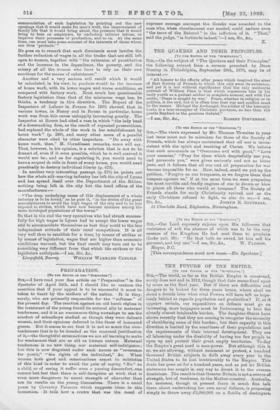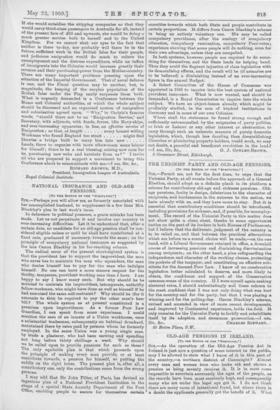THE FUTURE OF THE EMPIRE.
ITO THIO nurron or TIIR "SPROTATOR.1 Sin,—The world, as far as the British Empire is concerned, surely does not end in 1912, though that date seems fixed upon by some as the final year. But if there are difficulties and dangers to be looked for three years hence, where shall we stand a decade later when rival Powers will have left us hope- lessly behind as regards population and production? If, as it appears certain, our expenditure on defence must go on increasing, more taxpayers must be forthcoming to bear the already almost intolerable burden. The daughter-States have shown reCently that they are coming to recognise the necessity of shouldering some of this burden ; but their capacity in this direction is limited by the scantiness of their populations and the requirements of their internal development. They are all labouring under the disability of having too few people to open up and protect their great empty territories. To-day the Empire's great need is man-power. But although this is so, we are allowing, without comment or protest, a hundred thousand British subjects to drift away every year to the United States to be lost irretrievably to the Empire. This drain has gone on for a hundred years, and as yet no British statesman has sought in any way to divert it to the °verse& dominions. The result is that Greater Britain is not a source of strength, but of weakness, to the Mother-country. Australia, for instance, though at present there is much fine talk there about undertaking her own naval defence, is proposing simply to throw away £2,000,000 on a flotilla of destroyers, If she would subsidise the shipping companies so that they would carry third-class passengers to Australia for £5, instead of the present fare of £15 and upwards, she would be doing a ranch greater service both to herself and to the United Kingdom. For we cannot shut our eyes to the fact that neither is there to-day, nor probably will there be in the future, sufficient work in the British Isles for their people, and judicious emigration would do much to relieve the unemployment and the distress expenditure, while an influx of immigrants into the Colonies would increase greatly their revenue and their purchasing-power from the Mother-country. There are many important problems pressing upon the attention of the Imperial Government. That of naval defence is one, and the Fiscal question may be another, but, in magnitude, the keeping of the surplus population of the British Isles under the Flag easily surpasses them both. What is urgently demanded is a Conference between the Home and Colonial authorities, at which the whole subject should be discussed and an organised system of emigration and colonisation agreed upon. " Why," in Carlyle's famous words, "should there not be an 'Emigration Service,' and Secretary, with adjuncts, with funds, forces, idle Navy-ships, and ever-increasing apparatus; in fine, an effective service of
Emigration ; so that, at length every honest willing Workman who found England too strait might find likewise a bridge built to carry him into new Lands, there to organise with more elbow-room some labour for himself ; there to be a real blessing, raising new corn for us, purchasing new webs and hatchets from us ? " I invite all who are prepared to support a movement to bring this Conference about to communicate with me.—I am, Sir, &c., RICHARD ARTHUR, M.D., President, Immigration League of Australasia. Royal Colonial Institute.











































 Previous page
Previous page